Two Iranian Lawyers Call For Annulment Of Death Sentences For Protesters
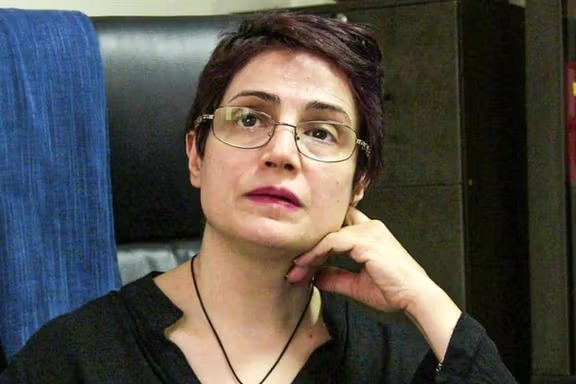
Two prominent Iranian lawyers have called for the unconditional release of all detained protesters and the cancellation of all convictions and sentences.

Two prominent Iranian lawyers have called for the unconditional release of all detained protesters and the cancellation of all convictions and sentences.
Nasrin Sotoudeh who is in prison and Mohammad Seifzadeh in a joint letter said revolutionary courts “do not have legal authority,” emphasizing that proceedings in such courts are not “fair and judges are not impartial.”
Hours before the publication of this letter Iran's Chief Justice Gholam-Hossein Mohseni Ejei said the death sentences for several protesters have been confirmed and will be executed soon.
The letter is one of the first reactions to the threatening statements made by the Chief Justice on Monday.
The two human rights lawyers also added that most of those arrested were “convicted in revolutionary courts…where they were deprived of the right to have an independent lawyer, and also due to lack of fair proceedings in the judiciary and the impartiality of the judges, the verdicts are completely invalid.”
Based on leaked briefing documents for senior officials from Fras News Agency, over 29,000 people have been arrested during nationwide protests against the regime following the death of Mahsa Amini.
None of the detained had the right to choose a lawyer, and a number of them have been tried and sentenced to death without access to a fair trial.
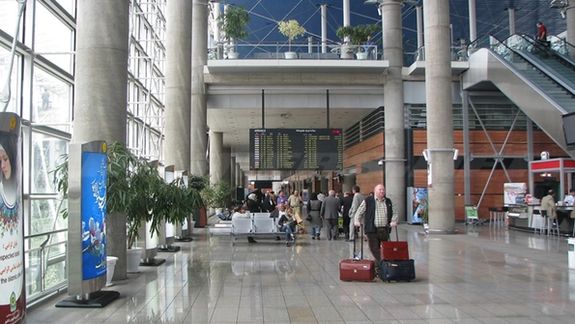
Amid nationwide protests, economic hardship and uncertainty about their future, more Iranians are emigrating, with Oman as a new favorite destination.
The accelerating exodus is not limited to medical and engineering professionals anymore as many business owners have also started to transfer their businesses to nearby countries where trade transactions are easier, especially to the Persian Gulf littoral states.
According to a recent article in the Tehran newspaper Arman Melli, during the past year about 30,000 personnel of different medical professions, including doctors, nurses, and paramedical technicians, have applied for Certificates of Good Standing with intent to immigrate to Oman. The paper claimed that within the last four years, 16,000 general practitioners have left the country. The high number of emigrations has become so alarming that the officials of medical organizations have warned of serious shortages of doctors in the near future.
In April, Iran's Medical Council said about 4,000 doctors have applied for Certificates of Good Standing in the previous 12 months with the intent to leave the country. Council spokesman Reza Laripour said that the annual number of such applications was less than 600 between 2013 and 2015.
Head of the Medical Council of the Islamic Republic, Mohammad Raeeszadeh, said, "The medical community faces fundamental challenges in some specialties, so that we may not have graduates in some fields in the future.” He warned of the risk of regression to 40 years ago when it had to hire foreign doctors to meet domestic needs.
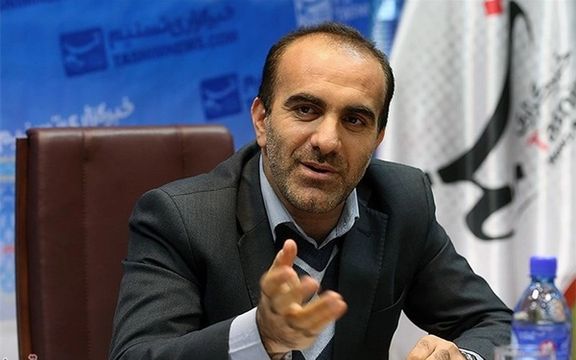
Lack of a promising future is the main reason why professionals decide to leave. Incomes have sharply declined in the past years as Iran’s currency has lost its value by more than tenfold, and the state seems to become more inept and arbitrary in governing the country.
On the backdrop of Iranian doctors emigrating in droves, the health ministry in September increased the exit permit bond for medical, dental and pharmacy students to $5,000 per year. Deputy minister for education at the health ministry, Abolfazl Bagherifard, said that students in graduate levels should provide 1.5 billion rials ($5,000) to leave the country for a year and undergraduate levels should provide bonds worth $2,000. Students must provide an official letter of commitment to return as well as another person's guarantee by depositing a real estate bond or a bank guarantee.
Experts and social scientists in Iran and abroad have told the media that the brain drain in the past few decades, beginning with the 1980-88 war with Iraq, has been accelerated by lack of social freedoms in the clerical-dominated system, political upheavals, deterioration of the economy, and government repression.
The government has stepped up pressures and restrictions on students and graduates. Late in November, the parliament presented a proposal to ban students who participate in protests from traveling abroad for ten years. Recently, the Ministry of Science Research and Technology has also approved regulations that would increase the costs of receiving university degrees six to 10 times.
All Iranians who study in government universities must work about twice the duration of their studies for a state institution before they can get their certificates. If they opt out of working for the government, they should pay the cost of their education to get their document. As per recent regulations, the fees to get their degrees have increased up to 10-fold.
However, even those measures are not enough to stop Iranians from leaving the country, with many families deciding to either send their children abroad before starting university or forgetting about getting a degree altogether. Ali Sharifi-Zarchi, a professor at Tehran’s Sharif University of Technology, believes that the new measures would even accelerate emigration, saying that the new fees mean that the government is urging students to forget about Iranian universities and study abroad where they can find a job and help pay for their expenses.
Almost half of Iranian youth want to leave the country amid pessimism about their future, a recent opinion survey conducted from abroad shows.
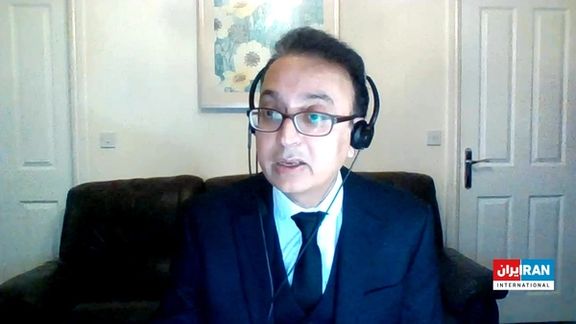
In an Iran International interview Javaid Rehman has outlined his plans for a UN probe into an “unprecedented level of violence and state brutality in Iran.”
Rehman, the United Nations Special Rapporteur on Human Rights in Iran, said the “independent and international” fact-finding mission established by a UN Human Rights Council vote November 24 would focus on Iran’s high number of executions, including drug offenders, “the killing of children and ethnic minorities,” and establishing accountability of individuals.
Rahman said 21 people involved in protests had been indicted on crimes carrying the death sentence, and at least “15,000 protestors arrested.” He applauded the Human Rights Council for “listening to the Iranian people,” and explained that he would be working very closely with the investigation given his “expertise and knowledge.” Rehman, a Pakistani-British legal scholar based in London, has been special rapporteur since 2018 but, unlike a UN special rapporteur on the human-rights consequences of sanctions, has not been allowed to visit Iran.
The UN mission, which reportedly will have a $3.67 million budget and 15 staff, would collect and preserve evidence for future prosecutions, dismissing “mis-information” and using the experience of members, Rahman said. He envisaged a detailed report by February-March 2024 for the council’s 55th session.
Accountability for human rights violations would come, he told Iran International, through “future legal proceedings” in international courts and through cases in national courts on the principle of universal jurisdiction. “These individuals better be careful because we are going to hold them accountable in courts of law,” he said.
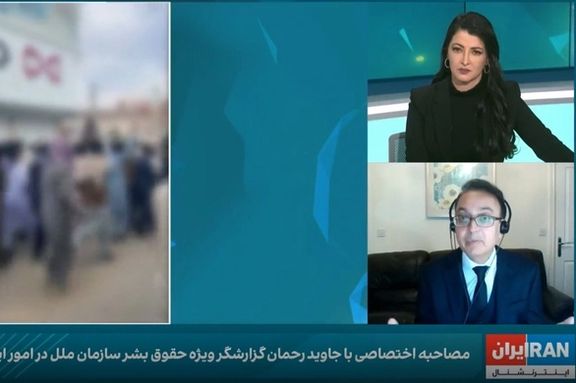
National courts have been generally reluctant to apply universal jurisdiction, with the United States among those world powers most resistant to the principle. In recent instances a Swedish court in July sentenced to life imprisonment Hamid Nouri, a former Iranian official, over 1988 prison executions, and in January a German court jailed for life Anwar Raslan, a former Syrian intelligence office, for murder and rape of prisoners in Damascus. Rahman did not explain any potential role of the International Criminal Court, which has generally indicted Africans and which the US has refused to join, insisting for example it has no jurisdiction over US troops in Afghanistan.
‘Key principles’
In his interview with Iran International’s TV correspondent and host Sima Sabet, Rehman criticized the Iranian constitution, which he said “violates democratic norms, violates key principles of constitutionalism,” including a lack of separation of powers. He called the judiciary’s role “problematic” and said one of his “big concerns” was women being excluded from “serious political positions.”
Looking ahead to the work of the UN mission, the special rapporteur welcomed submissions from victims of violence, and also from journalists and their families receiving threats “in the UK, European and north American countries.”
“That is what the Islamic Republic is all about,” Rehman said. “It wants fear to be spread…The Islamic Republic of Iran wants a complete blackout of the news.” Rehman encouraged Iran International to “continue your excellent work.” He noted that in contacts with Iranian officials, they had accused him of “talking to terrorists” and “not being objective.”
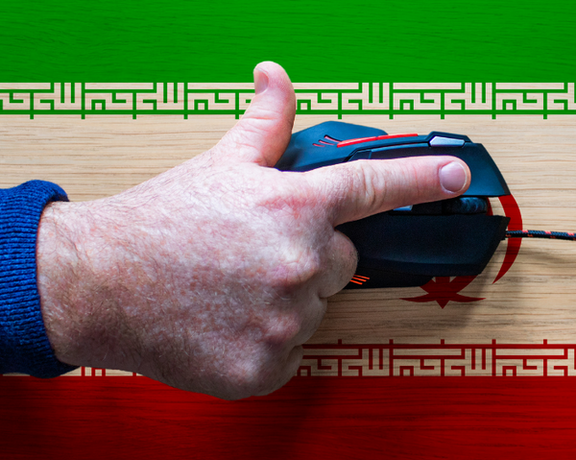
Regime-backed hackers in Iran have targeted several activists, journalists, researchers, academics, diplomats and politicians, Human Rights Watch has said.
The rights watchdog said Monday that two of its staff members and at least 18 other high-profile activists have been targeted by a phishing campaign.
The email and other sensitive data of a correspondent for a major US newspaper, a women's rights defender in the Persian Gulf region and Nicholas Noe, an advocacy consultant for Refugees International based in Lebanon, have been compromised by APT42.
An investigation, launched by HRW and Amnesty International, revealed that the phishing attack was probably conducted by a group known as APT42 which is affiliated with the Iranian regime.
“Iran’s state-backed hackers are aggressively using sophisticated social engineering and credential harvesting tactics to access sensitive information and contacts held by Middle East-focused researchers and civil society groups,” stated Abir Ghattas, information security director at Human Rights Watch.
Ghattas further noted that it significantly increases the risks that journalists and human rights defenders face in Iran and elsewhere in the region.
The APT42 earlier targeted medical research companies in the United States and Israel in late 2020, and academics from France, and the Middle East in 2019.
They have also attacked the media sector and interfered with the presidential elections in the United States.
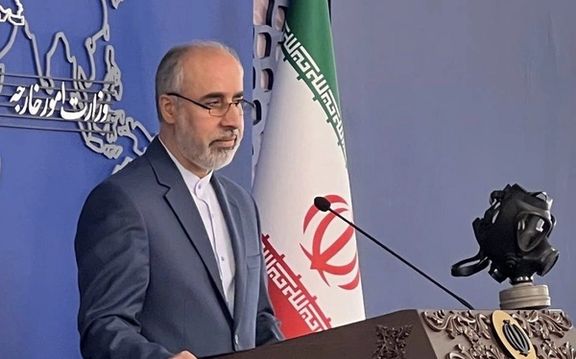
Iran’s foreign ministry reiterated Monday that ongoing protests in the country are an internal issue and others should not use the situation for political ends.
Ministry spokesman Nasser Kanaani in his weekly briefing on Monday lashed out at the United States and other Western countries for proposing to expel Iran from the UN Commission on the Status of Women.
US Vice President Kamala Harris said in early November that Washington will try to remove Iran from the 45-member CSW over the government's denial of women's rights and its brutal crackdown on protests. Some European countries have joined the effort as part of their reaction to Iran's mistreatment of women.
The Islamic Republic is just starting a four-year term on the commission, which meets annually every March and aims to promote gender equality and the empowerment of women.
Kanaani attributed all such attempts, including a UN Human Rights Council resolution passed last month calling for an investigation into Tehran’s violations during recent protests, as politically motivated actions by the West.
Iranian officials have been linking criticism of their human rights record to the stalled nuclear negotiations, trying to argue that any human rights censure is simply an attempt to put pressure on Tehran.
However, the unrest since mid-September and the deadly use of force against civilians has pushed the US, its European allies and Canada to unprecedented vocal criticism and limited new sanctions on the Islamic Republic.
The fact that protests started following the brutal killing of a 22-year-old woman arrested by the notorious ‘morality police’, and the leading role of young women in the ensuing protests, galvanized support not only in the West but also in other countries such as Turkey.
International criticism further weakens the clerical regime’s status inside the country because it comes as yet another sign of its isolation that has hurt the economy and impoverished tens of millions of its citizens.
This is why Kanaani on Monday tried to argue that criticism of Islamic Republic’s human rights record has not weakened its foreign relations. He claimed that Iranian foreign ministry and other officials are visiting different countries and receiving the appropriate reception.
He told reporters, “You follow news events and developments and are aware of various diplomatic trips of foreign ministry officials at different levels,” and the contacts of various typed with foreign governments.
In particular, he mentioned the recent regional travels by deputy foreign minister and nuclear negotiator Ali Bagheri-Kani to Russia, Qatar and India as a sign that the regime is not internationally isolated.
Kanaani also defended Iran’s bilateral relations with China, that has come under the spotlight of critics after Beijing signed a $60-billion gas deal with Qatar, while Iran’s production is decreasing due to lack of investments and technology.
Both countries share the same underwater gas reserves in the Persian Gulf, where Qatar has been expanding production in cooperation with Western oil giants, while Iran has lagged suffering from isolation.
“Islamic Republic’s ties with China constitute a relationship between that is growing,” he said, but admitted that US sanctions do pose limits om Tehran’s ability to broaden interactions with other countries.
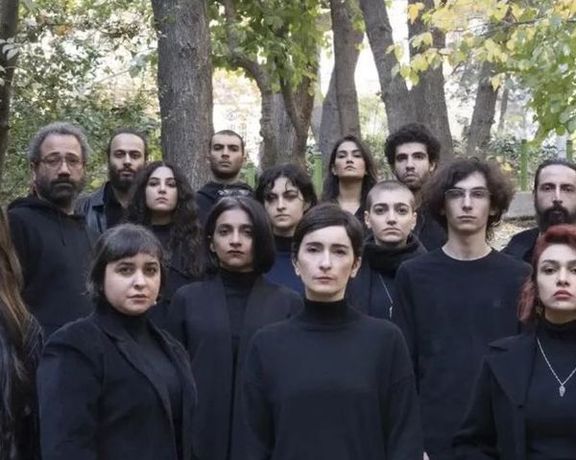
A member of the Committee to Follow up on Situation of Arrested Artists says at least 40 filmmakers have been detained during the national uprising against the Islamic Republic.
In an interview with Shargh daily on Saturday, Mehdi Kouhian said around 150 cinema figures have been summoned, arrested, accused, banned from leaving the country or persecuted in various ways by the regime during the recent protests.
He added that most of the detainees are "lesser-known figures whose families have not announced their names yet.”
To protect their privacy, said Kouhian, as long as their families do not reveal their identities, “we will not release the names of the incarcerated artists.”
According to Kouhian, the members of the committee met November 30 with one of the judiciary officials to call for the release of the arrested, and the official was also “very optimistic that the current situation will change, but within the past few days, another artist was apprehended.”
Kouhian was talking about famous cinema star Mitra Hajjar who was arrested for some hours recently.
Previously, Katayoun Riahi and Hengameh Qaziani, two other actresses, were arrested after posting their pictures without the mandatory hijab in solidarity with women who have been leading the antigovernment protests. However, they were later released on bail.
Toomaj Salehi and Emad Qavidel, the rap singers as well as some other directors and actors like Soheila Golestani and Hamid Pour Azari are still in custody.